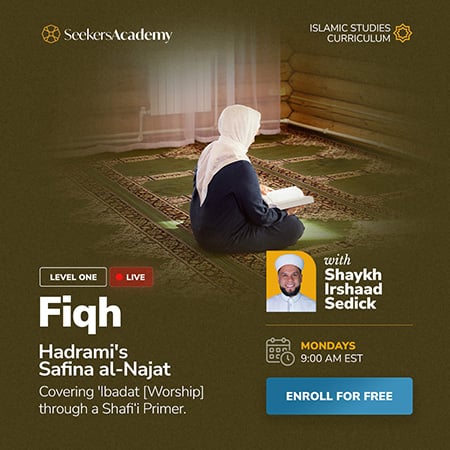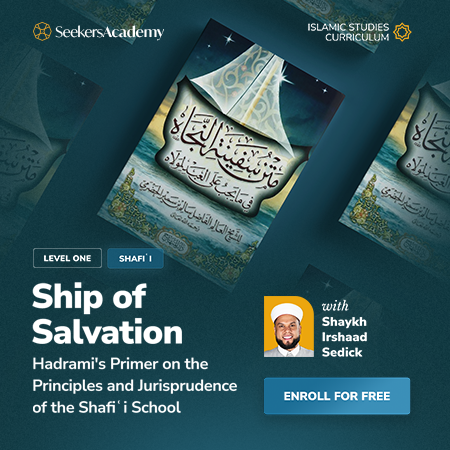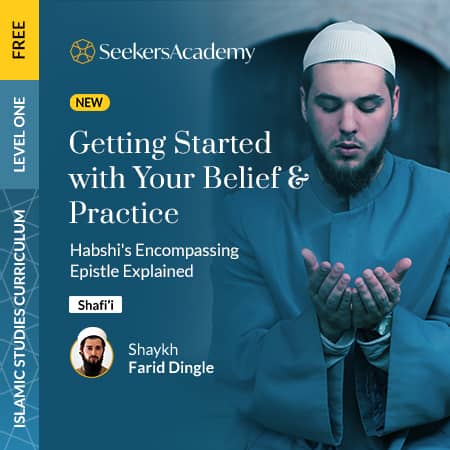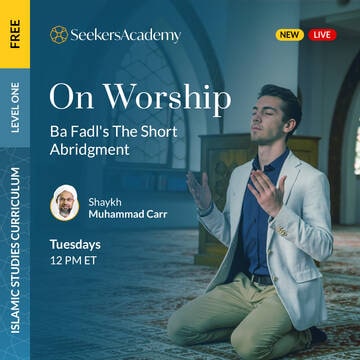
This course is designed to introduce students to the principles and practices of Shafi‘i fiqh, using the widely recognized text Safinat al-Naja by Shaykh Samir Salim ibn al-Hadrami. The course suits beginners interested in learning about Islamic law and the Shafi‘i school of thought.
Over several weeks, students will explore the fundamental principles of Shafi‘i fiqh, focusing primarily on the five pillars of Islam: the testimony of faith (shahada), prayer, zakat, fasting, and hajj. Through close readings of Safinat al-Naja, students will gain an understanding of the key concepts, terminology, and legal rulings related to each of these pillars
The course will be delivered through pre-recorded lectures, online discussion forums, and interactive quizzes and assignments. Students can also engage in live online discussions with the course instructor and other students.
By the end of the course, students will have gained a solid understanding of the basic principles of Shafi‘i fiqh. This course will be an excellent foundation for further study in Islamic law and related fields.
While no prior knowledge of Islamic law is required to enroll in this course, students should have a basic understanding of Islam and its core beliefs and practices. Additionally, students should be comfortable with reading and engaging with scholarly texts, as the course will involve close readings of Safinat al-Naja and other primary sources.
- Teacher: Mawlana Irshaad Sedick
The title Safinat al-Naja translates to "The Ship of Salvation," authored by the Hadrami scholar Shaykh Salim ibn Abdullah. The book is divided into several sections covering various topics related to Islamic law, including purification, prayer, fasting, zakat, and a basic overview of hajj. The text is written in Arabic and has been translated into several languages.
This concise treatise aims to act as a tool for laymen and beginners to gain clarity in their worship.
This course is primarily designed for beginners who are interested in learning about Shafi‘i fiqh and the principles of Islamic law. It is suitable for anyone who is interested in deepening their knowledge and understanding of the five pillars of Islam and other important topics related to Islamic law and tradition.
The course is especially beneficial for individuals who are new to the study of Islamic law and are looking for an accessible and comprehensive introduction to the subject. It is also appropriate for individuals who are interested in pursuing further studies in Islamic law and related fields, such as Islamic studies, Arabic language, or Middle Eastern studies.
- Understand the fundamental principles of Shafi‘i fiqh, including the five pillars of Islam and other important topics.
- Develop critical reading and analytical skills necessary for interpreting Islamic legal texts, including Safinat al-Naja and other primary sources.
- Gain a deeper understanding of the historical and cultural context of Islamic law and its evolution over time.
- Learn how to apply the principles of Shafi‘i fiqh to real-world situations and scenarios and understand the relevance of Islamic law in contemporary contexts.
- Develop the ability to engage in thoughtful and respectful discussions on topics related to Islamic law, tradition, and culture.
- Acquire a strong foundation for further study and exploration of Islamic law and related fields, including Islamic studies and the Arabic language.

This course is designed to introduce students to the principles and practices of Shafi‘i fiqh, using the widely recognized text Safinat al-Naja by Shaykh Samir Salim ibn al-Hadrami. The course suits beginners interested in learning about Islamic law and the Shafi‘i school of thought.
Over several weeks, students will explore the fundamental principles of Shafi‘i fiqh, focusing primarily on the five pillars of Islam: the testimony of faith (shahada), prayer, zakat, fasting, and hajj. Through close readings of Safinat al-Naja, students will gain an understanding of the key concepts, terminology, and legal rulings related to each of these pillars, as well as other vital topics such as marriage, divorce, and inheritance.
The course will be delivered through pre-recorded lectures, online discussion forums, and interactive quizzes and assignments. Students can also engage in live online discussions with the course instructor and other students.
By the end of the course, students will have gained a solid understanding of the basic principles of Shafi‘i fiqh. This course will be an excellent foundation for further study in Islamic law and related fields.
While no prior knowledge of Islamic law is required to enroll in this course, students should have a basic understanding of Islam and its core beliefs and practices. Additionally, students should be comfortable with reading and engaging with scholarly texts, as the course will involve close readings of Safinat al-Naja and other primary sources.
- Teacher: Mawlana Irshaad Sedick
The title Safinat al-Naja translates to "The Ship of Salvation," authored by the Hadrami scholar Shaykh Salim ibn Abdullah. The book is divided into several sections covering various topics related to Islamic law, including purification, prayer, fasting, zakat, and a basic overview of hajj. The text is written in Arabic and has been translated into several languages.
This concise treatise aims to act as a tool for laymen and beginners to gain clarity in their worship.
- This course is primarily designed for beginners who are interested in learning about Shafi‘i fiqh and the principles of Islamic law. It is suitable for anyone who is interested in deepening their knowledge and understanding of the five pillars of Islam and other important topics related to Islamic law and tradition.
- The course is especially beneficial for individuals who are new to the study of Islamic law and are looking for an accessible and comprehensive introduction to the subject. It is also appropriate for individuals who are interested in pursuing further studies in Islamic law and related fields, such as Islamic studies, Arabic language, or Middle Eastern studies.
- Understand the fundamental principles of Shafi‘i fiqh, including the five pillars of Islam and other important topics.
- Develop critical reading and analytical skills necessary for interpreting Islamic legal texts, including Safinat al-Naja and other primary sources.
- Gain a deeper understanding of the historical and cultural context of Islamic law and its evolution over time.
- Learn how to apply the principles of Shafi‘i fiqh to real-world situations and scenarios and understand the relevance of Islamic law in contemporary contexts.
- Develop the ability to engage in thoughtful and respectful discussions on topics related to Islamic law, tradition, and culture.
- Acquire a strong foundation for further study and exploration of Islamic law and related fields, including Islamic studies and the Arabic language.

“Whoever travels a path to seek knowledge, Allah thereby facilitates for him a path to Paradise.” (Muslim) This course is the first step in your pursuit of religious knowledge by Ahmad bin Zayn al Habashi, one of the great Shafi'i scholars of Yemen. It explains what your religion is, what you must know about it, and how you should learn it. This course is taught according to the Shafi‘i school.
- Teacher: Shaykh Farid Dingle
The Encompassing Epistle (al-Risala al-Jami'a) is one of the most celebrated introductory textbooks in the Shafi'i school.
- This is the first course of law in Level One course in worship for anyone seeking to know the most basic details of the five pillars of Islam according to the Shafi'i school.
- Any student who wants to learn about the basics of belief and worship and wants to start their journey of gaining sacred knowledge should start with this course.
- Understand how to seek religious knowledge
- Learn the basics of Islamic belief
- Learn the basic rules of wudu, ghusl, prayer, fasting, and zakat
- Learn how to worship Allah Most High with sincerity

Do you want to worship Allah confidently? Take this course to get comprehensive and knowledge-based answers to all the questions that you are likely to face in your worship of Allah Most High.
This is a Level One course in Shafi`i school of jurisprudence in the Islamic Studies Curriculum. This course is beneficial for anyone seeking to rectify their ritual acts of devotion to Allah.
This course empowers you to fulfill your ritual acts of worship confidently and provides a basic, yet comprehensive breakdown of worship. It focuses on the detailed rules of purification, prayer, funeral rites, zakat, fasting, spiritual retreat (i`tikaf), pilgrimage (Hajj), trade, and marriage. An outcome of the course is to memorize the text. Its bite size allows for easy memorization.
This indispensable primer text also serves as the ideal platform for further studies. The Short Abridgement was authored by the great Yemeni Shaykh Abdullah Ba Fadl (d. 918 A.H. / 1512 C.E.), whose works have been taught for centuries in traditional institutions all over the world.
- Teacher: Shaykh Muhammad Carr
The Mukhtasar al-Saghir (Short Abridgment) is an indispensable text taught the world over. It is regarded as foundational for every Shafi`i student. The short abridgment regarding that which is absolutely essential to know for every Muslim in the ritual acts of devotion.
The text covers the rules of purification, prayer, fasting, zakat, and hajj, according to the Shafi`i school, along with a brief introduction to the rules of trade, marriage, and divorce.
The main investigation (area of study) is to expose students to a basic yet comprehensive fiqh text that covers all the ritual acts of worship and the very basics of Islamic Contract Law.
- This is the second course in Level One.
- Before taking this course, take The Absolute Essentials of Islam (Shafi‘i).
- Take this course before taking any course in Level Two.
- Understand slave-hood to Allah Most High and why it is important.
- Learn the rules of purification and prayer that you are likely to encounter in your daily life.
- Memorize the most important rules of wudu and ghusl, prayer, zakat, fasting, hajj, and contracts.
- Appreciate the rigor of the science of Sacred Law (fiqh).

Having godfearingness (taqwa) is a prerequisite for being able to benefit from the great guidance of the Prophet (Allah bless him and give him peace).
Take this course to learn how to have godfearingness in most of the everyday situations that you are likely to encounter in your life, such as eating halal food, proper dress, interacting with the opposite gender, guarding your gaze, investing and saving your money, and guarding your tongue.
- Teacher: Mawlana Irshaad Sedick
- Students who finished The Absolute Essentials of Islam (Hanafi) or The Absolute Essentials of Islam (Shafi‘i)
- Appreciate the importance of the quality of godfearingness
- Know how to have godfearingness in dozens of everyday situations
- Improve your religious practice by keeping good company and making frequent repentance